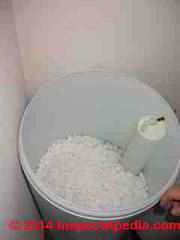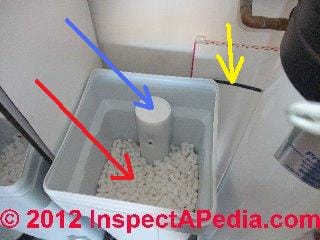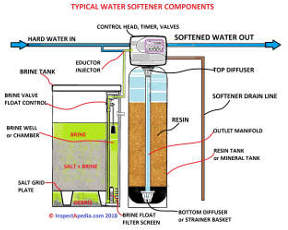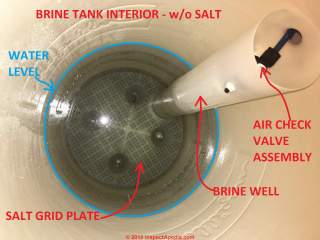 Water Softener Brine Tank Level Too Low
Water Softener Brine Tank Level Too Low
Salt Tank liquid level too low, insufficient salt dose, insufficient regeneration cycle, brine tank float repairs
- POST a QUESTION or COMMENT about how to diagnose water softener salt dosing tank or brine tank operating problems; too little water is in the brine tank, too little salt, inadequate water softener regeneration, water softener leaves water too hard
Water softener brine tank level too low:
What causes too little water in the water conditioner brine tank or salt tank & how do we fix it. If too little water enters the salt tank or brine tank the water softener regeneration cycle will be insufficient and the water conditioner will not adequately reduce water hardness.
Salt tank problem diagnosis & brine tank float control diagnosis & repair.
Diagnose & Fix Water Softener Problems: this article series describes procedures for diagnosing and repairing water softener or water conditioner problems including water conditioner control settings and adjustment or repair, brine tank and brine tank float cleaning and repair, and the proper amount of water softening or conditioning that is needed.
InspectAPedia tolerates no conflicts of interest. We have no relationship with advertisers, products, or services discussed at this website.
- Daniel Friedman, Publisher/Editor/Author - See WHO ARE WE?
Brine Tank Water Too Low: Not Enough Water in the Brine Tank
 Question: our water softener brine tank never fills up with water but we do see the salt level dropping - what's wrong with our water conditioner?
Question: our water softener brine tank never fills up with water but we do see the salt level dropping - what's wrong with our water conditioner?
The salt tank wont fill with water but salt level still goes down.
What's wrong with my water softener? - Tom 11/27/12
[Click to enlarge any image]
Reply: probably nothing
Tom,
The water softener brine tank does not normally FILL with water.
Rather, as water is pumped into the tank, water level in the brine well (blue arrow in my photo) rises under control of the brine level float switch usually found inside a vertical plastic tube in the tank, then pumping stops, salt dissolves to prepare brine for the next regeneration cycle.
At the next scheduled or manuyally-operated regeneration cycle, salty water or brine is pumped back out of the brine tank.
So you won't see the water unless you've let the salt run down to about 2/3 to 1/2 of the volume of the salt tank, perhaps even lower if the brine regen volume needed by your system is modest (e.g. if your water is not very hard and the volume of your water softener is small).  Sounds as if your system is working normally.
Sounds as if your system is working normally.
See WATER SOFTENER SALT DOSE SETTING to be sure that the salt dose is properly set for your water softener.
See WATER SOFTENER OPERATING CYCLES for a detailed description of what happens at each phase of water softener regeneration cycle. There's more going-on than one might have guessed.
Reader follow-up: what is the brine tank on a water softener?
The tank that holds the salt is the brine tank? or is the small tube with the salt level numbers the brine tank? - Tom
Reply: Photos and sketch given here show the water softener brine tank, brine level float control tube, and water/brine pumping tube
Tom
The tank that contains the salt crystals or salt pellets is the brine tank (red arrow in our photo above). The small vertical tube is the location of the brine level float control and will be found in the salt tank at one side (blue arrow in our photo above).
Water passes from the water softener resin tank (at the right side in our photo) into the brine tank through the black tube (yellow arrow in our photo above) to dissolve salt, and salty water is pumped back through the resin tank through that same tube.
Click to enlarge our detailed water softener sketch above and you'll see the brine tank at the left of the taller resin tank.
 Here is a photograph of the interior of a brine tank that contains some water but no salt at all.
Here is a photograph of the interior of a brine tank that contains some water but no salt at all.
More causes of an abnormally-low water level in the brine tank are at BRINE TANK DIAGNOSIS & REPAIR - home
Question: brine tank & float question - tank is not filling - stuck brine tank float valve assembly
I have an autotrol system and a brine tank with float. The tank is no longer reliably filling. I have replaced screens and filter in the autotrol head unit , which has fixed it in the past. However it is still not filling.
I think it may have to do with the float, it looks like when the level is too low, it stops flow?? Water comes out of the tube to the tank if i disconnect it. Slow or not sure when its connected to the float. Any suggestions? - Scott 7/8/12
Reply:
Scott look over the brine tank float switch info in the article above. The float should move freely up and down and the switch operates on float rise. If yours is stuck, clean the float vertical tube and all float parts and switch and try again - or replace The switch if needed.
Also see BRINE TANK WATER TOO HIGH
...
Reader Comments, Questions & Answers About The Article Above
Below you will find questions and answers previously posted on this page at its page bottom reader comment box.
Reader Q&A - also see RECOMMENDED ARTICLES & FAQs
On 2020-03-29 - by (mod) -
Danny
Also don't forget to check through the diagnostic suggestions on the page above
On 2020-03-29 by Danny
@Jim,
I am having the same problem. Did you ever get your problem resolved?
On 2020-02-14 - by (mod) -
Jim
You might just try an extra regen cycle. More diagnostic steps are at
WATER SOFTENER BRINE TANK WATER TOO HIGH
https://inspectapedia.com/plumbing/Brine-Tank-Water-Too-High.php
On 2020-02-13 by Jim
My softener was leaking at the o-ring between the control unit and the resin tank. Overfilled the brine tank.
I replaced the o-ring and resolved the leak.
Ran a recharge and it seems OK, however the brine tank is still full of water. Water was pumped out of the discharge hose. During the recharge. Is it supposed to pump a fixed amount of water everything in the brine tank? I checked the Venturi, no clogs.
Do I need to pump out the brine tank independently to kind-of reset everything?
On 2019-12-07 - by (mod) -
Jim:
Check first for a kinked or leaky plastic tube between the brine tank (water inlet) and the softener control head.
If that's not the issue double-check that it's the water level, not a stuck float.
If the float moves freely and the tube is intact then the problem is probably a clog or other failure in the softener control head.
Try a manual regen cycle.
Let me know what you find.
On 2019-12-07 by jim
I have a Kenmore watersoftner and over the the past couple month the water in the brine tank does not come high enough to activate the float.
On 2019-07-03 - by (mod) -
Softer may not be regenerating correctly the problem could be in the control head, or crimped tubing bringing water to the brine tank, or stuck brine float.
On 2019-06-25 by nan
Why would water softener have no water but has salt?
On 2019-02-25 - by (mod) -
Handy
If your dual-tank water softener is like the Fleck example we show below (as sold at Amazon) the control head alternates which resin tank is in service, thus giving a greater water treatment capacity than would be available from a single resin tank of the same size.
Here is an excerpt from the product description:
Dual Tank Twin tanks alternate treatment, providing maximum efficiency and ensuring soft water 24/7 SXT Controller LCD Display and touchpad controls for simple setup and added control On-Demand Flow meter measures water and regenerates based on water use, not time, conserving salt and water 48k (48,000) grain capacity Contains 1.5 ft³ of high capacity resin in each tank, capable of removing up to 48,000 grains of hardness between regeneration cycles 12 GPM Service Flow Treats a maximum flow rate of 12 gallons per minute
So first we understand that the two tanks are identical in design and function.
I looked at several Fleck 9000 manuals that described the dual-tank set-up, and found that not one of them identified a "tank 1" "tank 2" resin tank.
However the control head typically is mounted on what I would call "tank #1" just for consistency.
if you need a more-technical identification of which tank is in the role of "tank #2" you will have to look at the control head parts and part numbers.
And find these or other parts in the list I include as a graphic below
14864-01 second tank adapter assembly, 9000
14864-01NP second tank adapter assembly, 9000, nickel-plated
On 2019-02-25 by handyman
Hi,
How do i know which tank is number 1 in water softener with dual tanks? This is a Fleck9000 valve model.
Thank you
On 2018-08-02 by (mod) - With initial soft water set up do I need to add water to the salt tank
NO Gary,
The control head at the softener and the brine float valve at the brine tank should pump water into the brine tank.
But you will want to run an initial manually-initiated regeneration cycle to flush out, clean, and prepare the water softener for normal use.
Watch out: Typically your water softener's installation manual will provide a detailed sequence of steps to install, prepare, program, and then start up the water softener. These steps will vary a bit depending on the specific water softener brand and model.
Here is an EXAMPLE start-up procedure. TAKE NOTE that this is specifically for the Culligan Gold Series water softener so it will NOT be the exact procedure for your machine unless by coincidence that happens to be your model.
If you don't have the manual for your water softener you can get one from the manufacturer or from our page https://inspectapedia.com/plumbing/Water_Softener_Manuals.php WATER CONDITIONER / SOFTENER MANUALS
Culligan Gold Series & Culligan Total Home Automatic Water Conditioner
Recommended Aqua-Sensor® Start-Up Procedure
• Close the main water supply valve.
• Install the sensor probe into the tank but do not connect the sensor to the control at this time.
• Set the Cul-Flo-Valv® to the bypass position.
• Ensure that all faucets at the installation site are closed.
• Direct the drain line discharge into a bucket where flow can be observed.
• Plug the transformer into a 120 Volt, 60 Hz, single-phase receptacle.
• Wait for the control to energize the motor and home itself.
• Open the main supply valve.
• Initiate an immediate regeneration to move the control into the backwash position.
• Refer to the section on manual cycling for information on cycling the control through its positions.
• When in the backwash position, slowly shift the bypass to the soft water position until water flows.
• Continue backwash until the drain effluent is clear – at least 10 minutes (use a white foam coffee cup to occasionally collect a sample of backwash water; the stark white of the cup will show the presence of color throw and resin fines).
• After the backwash water runs clear, step the control to the Fast Rinse/Refill position to fill the brine tank and purge air from the brine line.
• Continue or repeat the backwash cycle if needed (while in the backwash step, you can pull the plug on the control and allow it to run as long as needed).
• Unplug the control and connect the sensor to the circuit board.
• Reconnect the power; the control will home again.
• To check the condition of the sensor, press the Information key, followed by the up key (the screen at right appears, HM alternating with the time remaining in the sensor lockout period
– should be 00); with a sensor connected the A enunciator should appear in the second digit from the left.
• Press the Information key and program the control to the desired settings.
• Complete installation and cleanup.
• Sanitize the unit as you leave the installation (see sanitizing procedure).
• Initiate a regeneration and allow the regeneration to run to completion.
The thorough backwashing process should have cleared the fines and color-throw from the tank. The probe should settle into the resin bed during the first couple of minutes of backwashing.
Also see
WATER SOFTENER CLEANING & SANITIZING
On 2018-08-02 by Gary
With initial soft water set up do I need to add water to the salt tank
...
Continue reading at WATER SOFTENER BRINE TANK DIAGNOSIS & REPAIR - topic home, or select a topic from the closely-related articles below, or see the complete ARTICLE INDEX.
Or see WATER SOFTENER BRINE TANK WATER TOO LOW FAQs - questions and answers posted originally on this page.
Or see these
Recommended Articles
- WATER CONDITIONER / SOFTENER MANUALS
- WATER SOFTENERS & CONDITIONERS - home
- WATER SOFTENER ADJUSTMENT & CONTROLS
- WATER SOFTENER BRINE TANK DIAGNOSIS & REPAIR - home
- WATER SOFTENER EDUCTOR / INJECTOR REPAIR
- WATER SOFTENER BRINE TANK AIR CHECK VALVE
- WATER SOFTENER BRINE TANK BRIDGING or CRUSTING
- WATER SOFTENER BRINE TANK DRAW REPAIR
- WATER SOFTENER BRINE TANK FLOAT VALVE ADJUST
- WATER SOFTENER BRINE TANK WATER TOO HIGH
- WATER SOFTENER BRINE TANK WATER TOO LOW
- WATER SOFTENER CLEANING & SANITIZING
- WATER SOFTENER SALT CHOICES
- WATER SOFTENER SALT DOSE SETTING
- WATER CONDITIONER / SOFTENER MANUALS - download the manual for your softener
- WATER SOFTENER OPERATING CYCLES
- WATER SOFTENER RUNS TOO LONG
Suggested citation for this web page
BRINE TANK WATER TOO LOW at InspectApedia.com - online encyclopedia of building & environmental inspection, testing, diagnosis, repair, & problem prevention advice.
Or see this
INDEX to RELATED ARTICLES: ARTICLE INDEX to WATER TREATMENT SYSTEMS
Or use the SEARCH BOX found below to Ask a Question or Search InspectApedia
Ask a Question or Search InspectApedia
Try the search box just below, or if you prefer, post a question or comment in the Comments box below and we will respond promptly.
Search the InspectApedia website
Note: appearance of your Comment below may be delayed: if your comment contains an image, photograph, web link, or text that looks to the software as if it might be a web link, your posting will appear after it has been approved by a moderator. Apologies for the delay.
Only one image can be added per comment but you can post as many comments, and therefore images, as you like.
You will not receive a notification when a response to your question has been posted.
Please bookmark this page to make it easy for you to check back for our response.
IF above you see "Comment Form is loading comments..." then COMMENT BOX - countable.ca / bawkbox.com IS NOT WORKING.
In any case you are welcome to send an email directly to us at InspectApedia.com at editor@inspectApedia.com
We'll reply to you directly. Please help us help you by noting, in your email, the URL of the InspectApedia page where you wanted to comment.
Citations & References
In addition to any citations in the article above, a full list is available on request.
- [1] North Dakota Standards for Water Softeners, North Dakota General Authority Law, Chapter 62-04-08, Water Softener Units http://www.legis.nd.gov/information/acdata/pdf/62-04-08.pdf. "The objective of this chapter is to provide a standard of quality, capacity, and performance for water softener units. Water softener performance is to be based upon referee tests procedures described in section 62-04-08-09."
- [2] Culligan Mark 10 Water Softener 1994-1998 Installation and Operating Instructions (covering models manufactured after 1995) (1-96) 01881948.pdf available from www.culligan.com
- [10] General Electric Corporation, Operation Manual, 740/760 [Water Conditioner or Water Softener] Control, 255 and Performa Series Valves, (268, 268 FA), General Electric Corp. 2007
- [11] Ecodyne Industrial, 1270 Frontenac Road, Naperville, IL 60563 Tel: 1 800-228-9326 (USA Only) Tel: +1 630-961-5043 Fax: 1 800-671-8846, Customer Service: 1 800-228-9326, Email: customers@ecodyneind.com, Website: http://www.ecodyneind.com/
- Our recommended books about building & mechanical systems design, inspection, problem diagnosis, and repair, and about indoor environment and IAQ testing, diagnosis, and cleanup are at the InspectAPedia Bookstore. Also see our Book Reviews - InspectAPedia.
- In addition to citations & references found in this article, see the research citations given at the end of the related articles found at our suggested
CONTINUE READING or RECOMMENDED ARTICLES.
- Carson, Dunlop & Associates Ltd., 120 Carlton Street Suite 407, Toronto ON M5A 4K2. Tel: (416) 964-9415 1-800-268-7070 Email: info@carsondunlop.com. Alan Carson is a past president of ASHI, the American Society of Home Inspectors.
Thanks to Alan Carson and Bob Dunlop, for permission for InspectAPedia to use text excerpts from The HOME REFERENCE BOOK - the Encyclopedia of Homes and to use illustrations from The ILLUSTRATED HOME .
Carson Dunlop Associates provides extensive home inspection education and report writing material. In gratitude we provide links to tsome Carson Dunlop Associates products and services.

